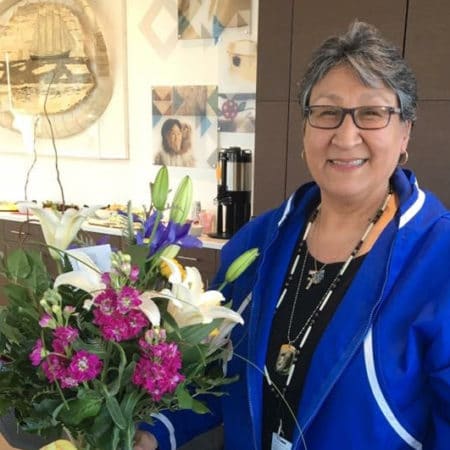Martha Akuliaq Cervantes, originally from Selawik, became a NANA employee in 1977. In 2013, she was named Shareholder of the Year. The honor “touched my heart,” she said. Martha Cervantes is a senior director of shareholder relations.
What is your Iñupiaq name?
I was named Akuliaq after an Elder from Noatak. There weren’t very many of us with that name, as far as I knew, just me and a boy from Noatak. He must be grown-up. Now, there are several in my family who are named after me.
How many children and grandchildren do you have?
Three kids. Seven, [Martha counts with her fingers] no eight, grandkids. And one “great.”
How long have you been with NANA?
Unofficially, I was 18 when I started. Officially, I came back in 1977 and worked for the people who were there from the beginning. Robert Newlin was chairman. John Schaeffer was president. I was their secretary. We called it secretary back then.
NANA was small. We all knew each other. We knew each other’s families and went to graduations, weddings and funerals. It was very family oriented. We took care of each other.
Speaking of family, where did you grow up?
In Selawik.
My parents had 11 children. We all lived in a one-bedroom house with no running water or flush toilets. Mostly we lived off the land. My dad went out for days on end to get us caribou meat. Mom made snares and set traps for ptarmigan. We picked berries, collected duck eggs and ate a lot of fish.
We didn’t buy anything from the store. Dad traded muskrat furs for macaroni, sugar and salt.
There was only one phone in Selawik. We didn’t have TV or video games. We played kick the can and made up our own games, like “Ted Williams.”
Ted Williams?
We opened the Sears catalog, turned the pages and every time we saw his name or logo, we yelled “Ted Williams” and that would be one point. [The Boston Red Sox hitter endorsed everything from baseball gloves to hunting boots and fishing rods.] He was our hero. We knew him from the catalog.
Where did you study or train?
My mother always wanted us to go to school. My parents didn’t have the same opportunities. They only went to third and fourth grade. To get to school, we crossed two rivers. Sometimes it was real cold, 60 below or more.
For the seventh and eighth grade, I was sent to the mission school in Aleknagik near Dillingham. It was hard to be away. We wrote letters; stamps cost three cents. I learned how to eat with a knife and fork. At home, we lived simply. We ate niqipiaq [Iñupiaq food] with our hands.
Then I went to Dimond [a high school in Anchorage], which was really difficult because the school was so big. In the 12th grade, I studied in Spain as part of an exchange program.
Did you learn Spanish?
Our classes were in English, but I learned enough Spanish to order ice cream. [laughs] We traveled around and toured museums. I think it was for six months.
We had good people taking care of us, but I was homesick.
What did you do next?
After high school, I completed a clerk/typist training program at Alaska Business College in Anchorage. There really was no choice. I had to learn skills to get a job.
While in training, my roommates and I lived in the same apartment building as Tony and his friends. [Tony is Martha’s husband.] He was a cook at La Cabaña, the Mexican restaurant. He was skinny and had cool ‘70s style hair. I said, “I’m going to marry that guy,” and I did. He still cooks for me. [He still has cool hair.]
Tell us about working at NANA.
I’ve had a lot of jobs over the years. I always wanted to expand my knowledge. I didn’t know anything. I didn’t have experience, but I was willing to learn.
After two or three years in one job, I transferred to another job so I could learn about each company. I learned to work with all kinds of different people.
I learned by watching my supervisors to see how they communicated. When I first started, I didn’t use my words. [Martha demonstrates. She shrugs to say, “I don’t know.” She wrinkles her nose to say “no” and raises her eyebrows to say “yes.”]
What are your job responsibilities?
I coordinate all the shareholder meetings. We hold informal meetings in villages, especially where a board seat is up for re-election. We also meet with shareholders in Kotzebue, Anchorage, Fairbanks and Seattle. At the annual meeting, the election is finalized, leaders give business updates and awards are given.
I coordinate the shareholder awards, but they took me off it in 2013. I thought, “Man, they’re taking my job.” Then they surprised me by giving me the Shareholder of the Year award.
The annual meeting location rotates. This year, we were going to meet in Kivalina. We planned a feast, a job fair and other activities, like games and dancing. Because of COVID-19, everything changed. To protect residents, no one traveled into the village. At a shortened meeting, they only held board elections.
I set up caucus meetings for NANA shareholders during the AFN conference. [This year, the Alaska Federation of Natives conference will be virtual.]
I provide support to NANA board committees for shareholder relations, village economic development and the Elders’ Trust.
What is your job title?
I don’t like titles. Some people have long titles. Mine is senior director of shareholder relations, but I don’t need to say it.
In the end, we should all be serving one another. We should all be washing dishes together, sweeping the floor, especially during the annual shareholders meeting. Lifting chairs, wiping tables. We should all be working together.
Who has inspired you?
John Shively was my favorite boss. [John joined NANA in 1975 and was the vice president of operations, then the chief operating officer.] From him, I learned what a real mentor was. He put us in jobs we didn’t think we could do. He valued employees, set high expectations and treated us as friends.
John spent a lot of time teaching me and showing me how to do things. He was patient and kind and didn’t get mad if I made a mistake. He made me learn how to drive, so I could run errands for NANA, like going to the bank and post office. Every day after work, I went to driving school. When I got into an accident, I wanted to give up. He said, “Nope, you’re going to drive.” So, during lunch we practiced until I got my confidence back. He encouraged me to go back to school to earn my two-year degree.
What important lessons have you learned?
Treat people with kindness. You never know what they’re going through. Use your heart. Little gestures of kindness make a difference.
Respect that people have different ways of doing things. It’s like peeling a banana. Some people peel it from the stem, others from the bottom up. You eat it. In the end, it’s the result that matters.
What is the strongest belief about what you do?
NANA’s owners are the shareholders. We need to remember that.
NANA is about helping each other and helping our shareholders, especially the Elders. We answer their questions and always return their phone calls.
What do you like best about your job?
One of the things I really like to do is help shareholders find and keep employment. That’s my heart. It makes me feel good.
Our people are strong. They’re hard workers. Recognize the skills they have, how they come together and take care of each other.
What advice do you have?
My least favorite words are, “You’re not qualified.” I encourage shareholders to find ways to add to your skillset. Become a notary, a proctor, a drug tester – things you can add to your resume. Add your volunteer experience, when you helped at the cookhouse or in the community center or with school activities. These are all good things.
Continue your education. Try to learn everything you can. There is no limit. The choice is yours.
Anything else you want to add?
Whatever obstacles you’re going through, those things are going to pass. If things are hard, they’ll get better. Don’t give up. No matter what the problem is, there is a solution. Ask Elders for advice. Ask for a prayer that will help lift you.



